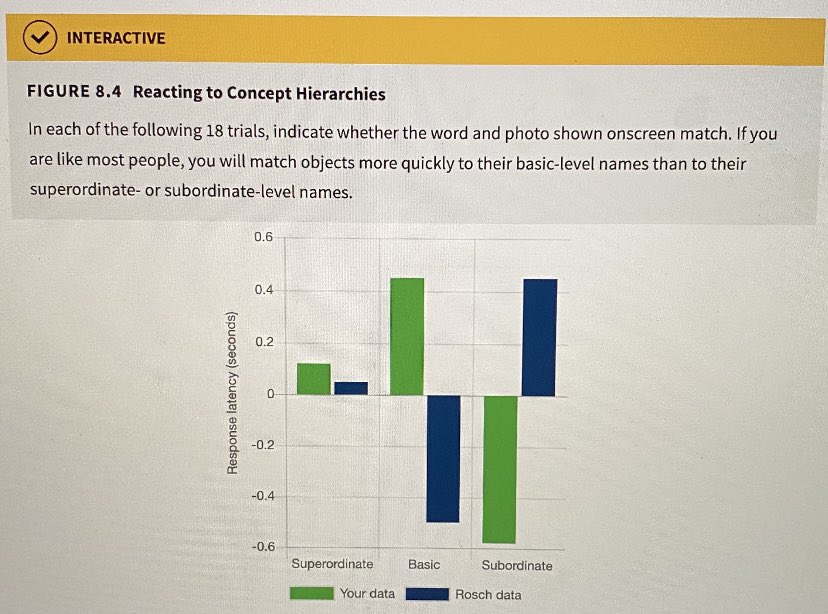
Yesterday I did an interactive experiment in my online psychology textbook. The section was about “concept hierarchies.”
The experiment measured my reaction times when categorizing objects in their superordinate, basic, and subordinate levels.
The experiment measured my reaction times when categorizing objects in their superordinate, basic, and subordinate levels.

According to the textbook, most people are faster at categorizing things at the basic level, and slower at the subordinate level.
But when I did the experiment (several times to make sure it wasn’t a fluke) my results were totally reversed for those levels.
But when I did the experiment (several times to make sure it wasn’t a fluke) my results were totally reversed for those levels.

My pattern of results seems to be in line with the local processing bias of autistic perception.
Autistic brains tend to process things from the bottom up.
So it makes sense that I would be faster at recognizing things at the subordinate level.
Autistic brains tend to process things from the bottom up.
So it makes sense that I would be faster at recognizing things at the subordinate level.
I looked for research on concept hierarchies and object categorization in autistic people, and I found this study (citeseerx.ist.psu.edu/viewdoc/downlo…).
The key finding: autistic people are much slower at placing atypical objects into their basic level categories.
The key finding: autistic people are much slower at placing atypical objects into their basic level categories.
However, the explanation for this result given in the study (that subordinate level processing is impaired in autistic people) doesn’t make sense to me in light of my performance on the experiment in my textbook.
There’s a different explanation that makes more sense to me.
There’s a different explanation that makes more sense to me.
For context:
Atypical objects are objects that are not very good general representations of their basic level category.
For birds, an atypical example would be a penguin or a kiwi bird. For chairs, an atypical example would be a baby’s high chair.
Atypical objects are objects that are not very good general representations of their basic level category.
For birds, an atypical example would be a penguin or a kiwi bird. For chairs, an atypical example would be a baby’s high chair.
Autistic people are much slower at putting atypical objects in basic level categories.
But I don’t think this is because we’re having trouble processing what the object is.
I think it’s because we’re processing at the subordinate level first, and then we have to make a jump.
But I don’t think this is because we’re having trouble processing what the object is.
I think it’s because we’re processing at the subordinate level first, and then we have to make a jump.
If someone shows me an object and asks me to name it, I default to the most specific answer.
When I see a goose my first thought is not “That’s a bird,” it’s “That’s a goose.”
So of course I’ll be slower to put it in the “bird” category than to name it specifically.
When I see a goose my first thought is not “That’s a bird,” it’s “That’s a goose.”
So of course I’ll be slower to put it in the “bird” category than to name it specifically.
The lessons taught in psychology textbooks about the ways most people process things, need to include more information about exceptions to those rules.
Not everyone processes things the same way, & processing differences need to be understood — not just framed as “deficits.”
Not everyone processes things the same way, & processing differences need to be understood — not just framed as “deficits.”
• • •
Missing some Tweet in this thread? You can try to
force a refresh




